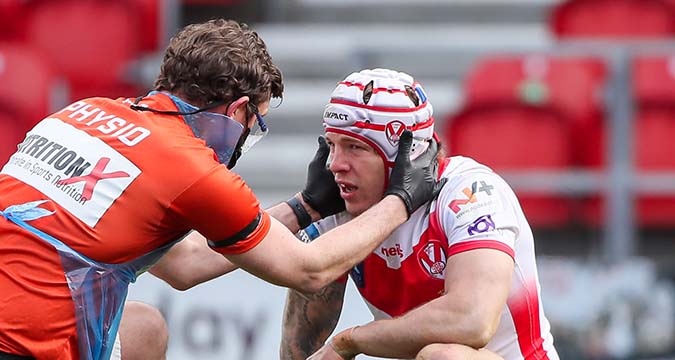
Players who fail a concussion test will be stood down for at least 11 days under new protocols to be implemented this season.
The RFL Board have confirmed the change to their Graduated Return To Play protocols, following a recommendation from the sport’s Clinical Advisory Group.
Across the whole game, any player who fails a concussion test during a match or in training will be not be permitted to play another fixture for a minimum of 11 days.
This is an increase from the current seven-day timeframe and means players who suffer a concussion will automatically miss the following week’s match.
As is already the case, their readiness to return to training, contact and matches will be monitored by medical specialists.
In a further move, sentencing guidelines have also been amended for on-field foul play, with harsher punishments set to be handed down for a range of conduct.
Sentences for striking, headbutting, kicking and late hits are set for a “further stiffening” in the upcoming season to disincentivise dangerous play and protect players.
“Given the priority of player welfare, Rugby League continues to seek both to respond to increases in medical knowledge, and to provide relevant information,” said Robert Hicks, the RFL’s director of operations and legal.
“Our priority as a sport will always be to protect players and make the game as safe as possible, working with all relevant stakeholders and including Government through the DCMS Committee.”
Meanwhile, the RFL are also preparing to launch a game-wide research project on head impacts from the beginning of the 2022 season.
All 12 Super League clubs are committed to working with the RFL and researchers at Leeds Beckett University on the TaCKLE project – Tackle and Contact Kinematics, Load and Exposure – following a pilot study last year.
Teams from the Women’s Super League, Under-18s Academy competition, and Open Age, Under-16s and Under-14s teams from the community game will also take part, encompassing a total of more than 1,000 players.
They will wear instrumented mouthguards, which were trialled last year by Leeds Rhinos and will be used to measure head impact exposures, biomechanical mechanisms during concussion events, and how tackle technique and tackle height influence head acceleration loading.
